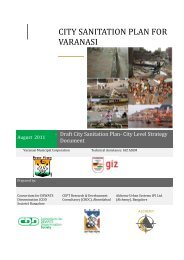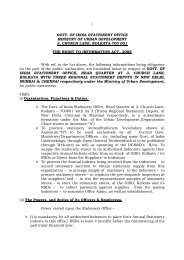CITY SANITATION PLAN - Ministry of Urban Development
CITY SANITATION PLAN - Ministry of Urban Development
CITY SANITATION PLAN - Ministry of Urban Development
You also want an ePaper? Increase the reach of your titles
YUMPU automatically turns print PDFs into web optimized ePapers that Google loves.
<strong>CITY</strong> <strong>SANITATION</strong> <strong>PLAN</strong> BAREILLY<br />
Kalyani Municipality-Community-Led Health Initiatives with Community Led Total Sanitation (CLTS) As<br />
The Entry Point<br />
Kalyani Municipality’s CLTS empowers local communities with the goal <strong>of</strong> creating an open, defecation-<br />
free environment, especially in slums, through a participatory approach <strong>of</strong> self-mobilization and<br />
facilitation. This brings about behavioural change to ensure 100% sustained usage <strong>of</strong> sanitary toilets,<br />
thereby making Kalyani an Open Defecation Free (ODF) area.<br />
Context<br />
Kalyani, located 65 km north <strong>of</strong> Kolkata in West Bengal, is one <strong>of</strong> the 39 municipalities under Kolkata<br />
Metropolitan Area (KMA) with a population <strong>of</strong> 0.1 million, <strong>of</strong> which approximately 50% lives in 52 slums.<br />
These people have mainly migrated from neighboring Bangladesh. Over the past ten years, more than<br />
Rs. 3 crore has been spent on different projects for constructing toilets for the urban poor, improving<br />
the sanitation pr<strong>of</strong>ile <strong>of</strong> Kalyani. Despite a lot <strong>of</strong> investment from different projects, Kalyani was not<br />
open-defecation free (ODF), as this was a common practice even amongst those given toilets free-<strong>of</strong>-<br />
cost by donor agencies. This led to a lot <strong>of</strong> health problems amongst other citizens as well.<br />
Initiative<br />
Against the above background, CLTS was conceived in late 2005 under the Kolkata <strong>Urban</strong> Services for<br />
The Poor Programme (KUSP), funded by the Department For International <strong>Development</strong> (DFID). The<br />
chairperson <strong>of</strong> Kalyani Municipality showed political will and leadership in motivating its councilors and<br />
making Kalyani an ODF town. The Board <strong>of</strong> Councilors (BoC) unanimously accepted the proposal to pilot<br />
the CLTS project in Kalyani Municipal Area in January 2006. The chief health functionary <strong>of</strong> the ULB<br />
coordinated and facilitated the implementation <strong>of</strong> the entire programme.<br />
Initially, the pilot project was implemented in five slums only. However, inspired by the success <strong>of</strong> the<br />
project, Kalyani decided to make all the 52 slums ODF. A team <strong>of</strong> experts, including a Participatory<br />
<strong>Development</strong> Consultant and medical doctors, were involved in the initiative that conducted a series <strong>of</strong><br />
ADMINISTRATIVE STAFF COLLEGE OF INDIA, HYDERABAD Page 217
















